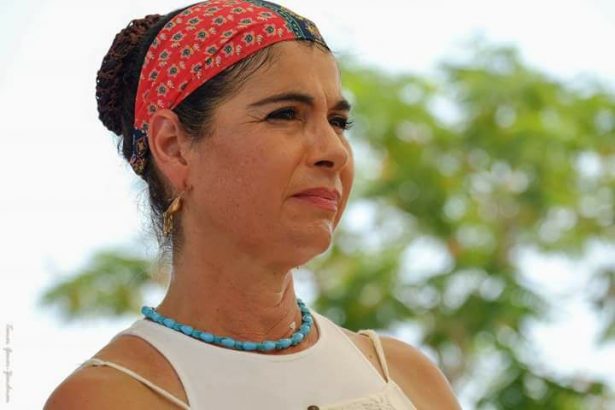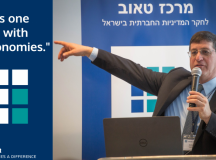Hamutal Gouri is the former executive director of the Dafna Fund and the founder of consult4good, a feminist activist and storyteller for social change. She argues here that too much of the Israeli public is passive and willing to vote against its own interests and desires. While more than 50 per cent of the public, Jews and Arabs support some form of a mutual peace agreement, 71 per cent believe that rule over the Palestinian people is wrong and 76 per cent care more about social and economic issues, nonetheless, more than 50 per cent apparently still want the Likud to win the election. Another Israel may be possible, but not until Israelis embrace their political agency.
The April 2019 elections were characterised by toxic, divisive discourse, with little public conversation about welfare, education, the environment, social and economic justice or a peaceful resolution to the Israel-Palestinian conflict. In fact, the April 2019 election campaigns may be remembered in history as a race to win the ‘who killed more Palestinians’ award. Netanyahu, with a dark cloud of a pre-indictment hearing hovering over his head, was still the most powerful contender and Gantz, aspiring to replace him, had to keep up with the tone and the rules of the game as written by ‘Mr Security’.
So far, the 17 September election is little different. We see the same theatre of the absurd, albeit with some changes in the cast. Ehud Barak has come in from the cold and for a minute was a serious contender. Ayelet Shaked has made an impressive comeback after the failure of the ‘New Right’ in the April elections. Avigdor Lieberman is attempting to play the role of the knight-in-shining-armor who will vanquish institutional religious coercion.
But the leading actor remains the same. Once more the election is about Bibi: ‘Only Bibi’, or ‘Anyone but Bibi’. The country remains caught up in a tale told by the man who can now boast of having held the position of Prime Minister for longer than anyone else. There are many reasons for this state of affairs but the Israeli public – too passive, too cynical, not engaged enough with each other or with politics – can’t escape all responsibility.
Israelis are unenthusiastic about this election
According to the Peace Index – a longitudinal research project based on a monthly survey that monitors public sentiment on the Israeli-Palestinian conflict, relations between Jews and Arabs in Israel, and current events of a political or diplomatic nature – the majority of the Jewish public did not even want these elections: ‘Among the Jewish public, a large majority feel that Netanyahu should have returned his mandate to the president and not have called for new elections’.
And yet, there was no public uproar following the decision to dissolve the 21st Knesset and go for new elections, a decision which the Peace Index found the majority of public believes was driven by personal rivalries and interests – not the concern for the public good.
Furthermore, according to the Peace Index, ‘a clear majority oppose legislation that would enable Netanyahu to avoid going to trial while serving as prime minister’. How can we reconcile this finding with another from the same survey, that ‘more than half of the Jewish public in Israel prefer that, following the coming elections, the government will be formed by the Likud’? One possible explanation is that the public is willing to let suspicions of criminal activity slide if Netanyahu continues to ‘deliver the goods’. Another explanation is that the public wants a right-wing government, with or without Netanyahu.
Israelis are pessimistic about peace
Surveys conducted in recent months show that on the issue of the Israeli-Palestinian conflict, there is a clear gap between what the public wants or believes to be right, and what it believes to be plausible.
One survey, ‘Faith, Peace and Shared Life’, presented at a conference organised jointly by Shaharit, the Citizens Accord Forum, and the Van Leer Jerusalem Institute in March 2019, showed that 78 per cent of the Jewish public thinks that Israeli control over the Palestinians in the West Bank is bad, but most of them also believe there is currently no other choice. 71 per cent said that the Israeli rule over Palestinians is morally wrong. 51 per cent said that religious leaders of all faiths in the region should participate in decision-making regarding a possible peace agreement.
Professor Shat Lavie, Head of the Van Leer Institute said, in his opening remarks to the conference, ‘the discourse about peace, the discourse of the peace camp, is in crisis, in a coma. The upcoming elections are about corruption, getting away with it and Cannabis not about peace. Peace, like occupation, has become a bad word that one should not articulate’.
According to the June 2019 Peace Index, findings among the Jewish public indicate that the two-state solution remains the most popular with 40 per cent of the supporters (moderately support or very much support) in comparison to 51.5 per cent who oppose this solution (moderately oppose or very much oppose). The next solutions in descending order of support are annexation of the territories (32 per cent support versus 60 per cent opposition), continuing the existing situation (26 per cent support versus 64 per cent opposition), and a bi-national state (16.5 per cent support versus 73 per cent opposition).
A different picture emerges in reply to the question, ‘Which of the solutions do you believe has a chance of being achieved in the visible future?’ Among the Jewish public, 46 per cent replied that a continuation of the present situation has the best chance of being realised, and only 4 per cent believed that a bi-national state could be established in the near future. Among the Arab public, an even clearer majority (60 per cent) believes that the present situation will continue.
Israelis are reluctant to take their own side in an argument
A survey conducted March 2019 by the Smith Institute for the Israel Social TV and in collaboration with HAOKETS — a critical platform on socioeconomic, political, media, cultural and other issues in Israel and beyond — shows that the public cares more about social and economic issues than about foreign policy; only 31 per cent of the respondents said that the Netanyahu government acted to reduce poverty and 72 per cent said that the way the State measures poverty does not reflect its dimensions in reality. 76 per cent say they will vote for a party based on its social-economic platform, versus 56 per cent who said they will vote for a party based on its foreign policy and security platform. 32 per cent believes that left wing parties are more concerned with social and economic issues, as compared with 19 per cent who said that about right-wing parties, and 24 per cent said that neither left or right wings parties are focusing on social and economic issues.
The findings of these recent surveys suggest that the Israeli public is voting against its own interests and desires. If more than 50 per cent of the public, Jews and Arabs, support some form of a mutual peace agreement, if 71 per cent believe that rule over the Palestinian people is wrong and if 76 per cent care more about social and economic issues, why do more than 50 per cent want the Likud to win the elections again?
There are several possible explanations: first, the public likes winners and the Likud under Netanyahu has been on a winning streak since 2009.
Second, at least 50 per cent of those with voting rights believe Netanyahu to be a good prime Minister who made Israel a global superpower with influential allies.
Third, the mistakes of most left wing leaders who either turn their backs to communities that traditionally vote for right-wing parties or insult the public’s intelligence by pretending to be a center-right alternative to Netanyahu.
Fourth is the perception, gaining some traction in the Knesset and in the public, that the Israeli-Palestinian conflict will only end with Israel’s military victory and the Palestinian admission of defeat. The Knesset Caucus of the ‘Israel Victory Project’ seeks to ‘send a clear message about the necessity of a clear military victory over Israel’s enemies’. The idea is that if we wait long enough the Palestinian people will acknowledge defeat and settle for economic peace or limited rights under Israeli rule is now articulated by many politicians on the right. The prevailing despair regarding the possibility of a mutual and peaceful resolution of the conflict certainly gives rise to unilateral, even violent, ideas.
Israelis devalue women politicians
In the last decade, no man has beaten Netanyahu at his own game and no woman has even tried. Only one woman, Ayelet Shaked, heads a political party, the United Right, now ‘Yemina’. Her popularity trumped the conservative stance of the United Right party leaders on the question of the inclusion of women in politics. Thus, the party that sees a woman leader as an electoral asset is also the one that did little to advance women’s rights and gender equity in the previous Knesset.
One woman who has made headlines in recent weeks has been Carmen Almakayes-Amos, a long-time social change activist and leader, number 10 in the Labor-Gesher party list. While the announcement of her running for the Knesset sparked racist responses on social media, Almakayes-Amos also received substantial public support from thousands who know her as a courageous civil society leader of great integrity and resilience.
Stav Shafir, who was lauded as the orchestrator of the unification of Meretz and the Democratic Camp, had a few moments of glory as the one who made Nitzan Horowitz of Meretz and Ehud Barak see reason and put their egos aside for the greater good. Her political rivals depicted her as an opportunist leaving Labor’s sinking and the same is said about Orly Levi-Abekassis, Head of Gesher party, regarding her decision to unite with Amir Peretz’s Labor. The treatment of Shafir and Levi-Abekassis is typical of the fierce scrutiny that women politicians are subjected to in Israel. Their qualities as leaders are devalued, the issues they champion are marginalised, and their shortcomings are placed under a magnifying glass. Women politicians are frowned upon if they do not make to the headlines; their work deemed marginal or less important. However, they get no points for making headlines either, being depicted in that case as ‘pushy’ and ‘loud’.
Israelis are put off by righteous anger
Last month, following the killing of 18-year old Solomon Teka by an off-duty police officer, the Ethiopian Jewish community, and especially the youth, took to the streets to protest the killings of young men, over policing and institutional racism by the police. The spontaneous demonstrations obstructed public order; roads were blocked, and one car was torched. Prime Minister Netanyahu aired a short video saying the rule of law must be respected and thousands of people wrote on social media that ‘they lost my support when the demonstrations resorted to violence’. The people who did not speak up against institutional violence and racism were quick to judge those whose voices of rage and frustration were ignored for a very long time.
Saul Alinsky, the legendary labor organiser, wrote in his classic book, Rules for Radicals, that ‘The means-and-ends moralists, constantly obsessed with the ethics of the means used by the Have-Nots against the Haves, should search themselves as to their real political position. In fact, they are passive—but real—allies of the Haves’. Indeed, complicity, even when silent, serves to maintain power relations intact.
Without political participation, democracy is thin and broken
In a democratic society the public has the duty to challenge its elected leaders and critically question hegemonic ideas. If the public is complacent, willing to relinquish its civic power or only express it in the very limited form of casting a vote, then we are left with a thin and broken democracy. To exercise grassroots civic power, we need a civic imagination and radical hope; the ability to imagine a better future, even when it is far beyond the horizon.
Today, the Israeli public has a dearth of faith in its own ability to be part of a social and political transformation. The statement by Ehud Barak after the failure of the peace talks in 2000, that ‘there is no partner’, has become the gospel for many Jewish Israelis. We tell ourselves that we want peace, but the Palestinians do not. We say we care about social and economic gaps, but we are constantly justifying the glaring gaps in income between men and women, Jews and Arabs, Ashkenazi and Mizrahi Jews, native Israelis and immigrants, and between those living in the center of Israel or its periphery. We repeat the ruler’s discourse rather than challenging it.
Yes, those who do challenge the government policies or hegemonic discourse may well find themselves labeled as traitors or party poopers. Artists and TV hosts who dare share their views on racism, or the exclusion of the Arab community, are the target of toxic tweets. In one case, the prime minister himself found the time to respond to a popular actress and TV presenter when she shared the idea that human beings were created equal. This highly toxic environment encourages people to keep their heads down at best, to blame the victims at worst.
Israelis need to cultivate a sense of agency and urgency
Promoting social and political change requires a civic consciousness and a sense of agency to act in political arenas and impact the political discourse. It requires a tradition of critical thinking and dissent, and a public climate that welcomes and appreciates diversity and differences and it requires bottom-up power gained through activism and movement building.
The spaces that cultivate civic consciousness and engagement and foster people as agents of social change agents exist in the form of social change organisations and movements, independent media and progressive think tanks and in on-line communities and networks. These groups advocate for better policies, more equitable public resource allocations and protect the marginalised and the under-served from the coercive power of institutions. They offer people a platform to discover and exercise their agency and leadership and they experiment with participatory structures to ensure the distribution of power among diverse stakeholders. They invest in creating safe spaces for courageous conversations and working through differences, no matter how deep they run. They do so, in an environment that is highly volatile and often in a hostile climate.
In my long career as social change leader and activist I had the privilege of being inspired by the passion, compassion and commitment of so many people who continue to practice radical hope. I met with people from all walks of society and of diverse political affiliations who were determent to reach out and work in partnership with others. What fueled this determination, despite the hardships, was the persistent understanding that another world is possible, that change is not only needed, but also inevitable.
Progressive think tanks, applied research institutes and independent media provide us with the data and information we need, as agents of social change, to produce new knowledge and to hear the voices of people that never make front page headlines. Knowledge is power; when we have access to knowledge, we have the power to make a difference.
The most inspiring social change leaders I have met are people of great empathy and compassion and a keen sense of purpose that makes them both proud and humbled by the power they have achieved and the responsibility that came with it. The sources of their power came from recognising the importance of investing in relationships, in collaborative power structures and whose actions were deeply rooted in values of freedom, justice and equality. They were not necessarily ‘nice’ people, but they were kind people.
Those social change leaders represent the kind of leadership that we need now, people who will share a compelling vision of a future of equality, justice and peace; close the gap between what the public wants and believes to be right and what the public believes is possible. But it is up to Israelis to wake up and make their hopes and priorities known to those seeking their vote.






































